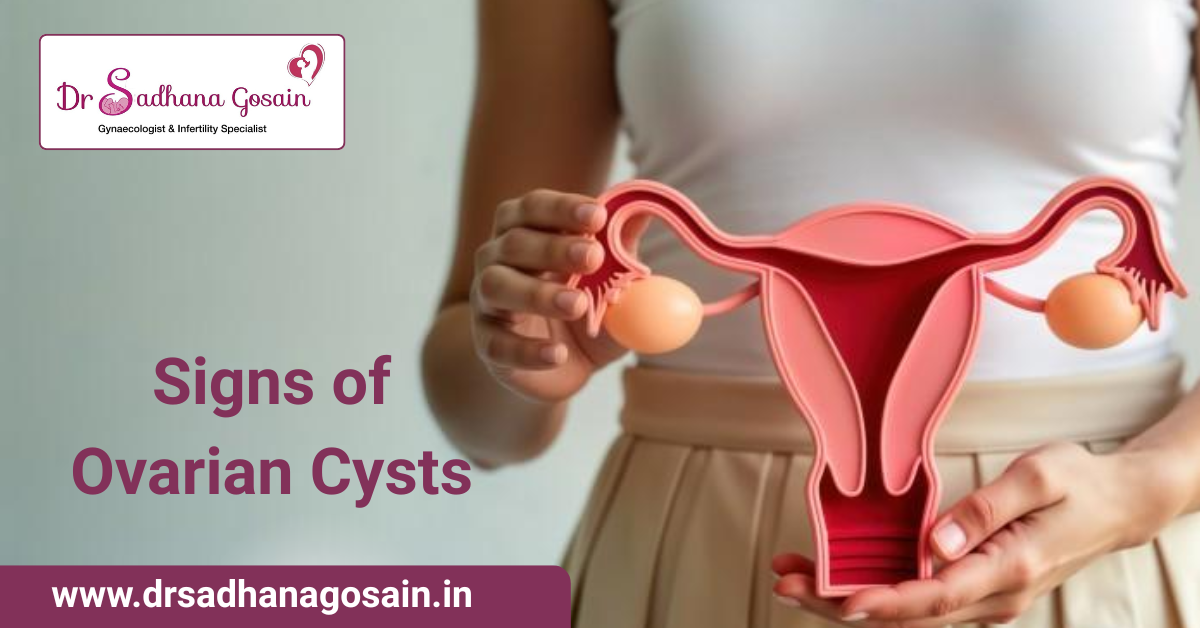
Signs of Ovarian Cysts: What Every Woman Should Know

Signs of Ovarian Cysts: Ovarian cysts are fluid-filled sacs that develop on or inside a woman’s ovary. While most ovarian cysts are harmless and go unnoticed, some can cause uncomfortable symptoms and lead to complications if left untreated. Recognizing the signs of ovarian cysts early is key to maintaining your reproductive health.
In this comprehensive blog, we will explore:
-
What are ovarian cysts?
-
Common types of ovarian cysts
-
Early and advanced signs of ovarian cysts
-
When to see a doctor
-
How ovarian cysts are diagnosed and treated
-
Preventive care and expert help
If you’re experiencing unusual pelvic pain or irregular periods, read on to understand what your body might be trying to tell you.
What Are Ovarian Cysts?
Ovarian cysts are sacs filled with fluid that form on the ovaries. Every woman who menstruates develops small cysts as part of the normal menstrual cycle, called functional cysts, and they usually resolve on their own. However, some cysts become enlarged or persist longer than normal, which may require medical attention.
Types of Ovarian Cysts
Understanding the type of ovarian cyst helps in identifying symptoms and treatment options. Here are the most common types:
1. Functional Cysts
These develop during ovulation and often disappear within a few weeks:
-
Follicular cyst – forms when the follicle doesn’t release an egg.
-
Corpus luteum cyst – occurs when the follicle releases an egg but fails to shrink afterward.
2. Dermoid Cysts
These can contain tissue such as hair, skin, or teeth. They are congenital and usually benign.
3. Endometriomas
These develop as a result of endometriosis. They are filled with dark, thick blood and may affect fertility.
4. Cystadenomas
These are filled with watery or mucous-like fluid and can grow quite large.
5. Polycystic Ovaries
A condition where many small cysts develop due to hormonal imbalance, commonly seen in Polycystic Ovary Syndrome (PCOS).
Common Signs of Ovarian Cysts
Many ovarian cysts do not cause symptoms and are discovered during routine pelvic exams. However, certain signs and symptoms should never be ignored. Below are the most commonly reported signs of ovarian cysts:
1. Pelvic Pain
Persistent or intermittent pain in the lower abdomen or pelvic area, especially on one side, is a hallmark symptom. The pain may feel sharp or dull and can worsen during menstruation or intercourse.
2. Bloating or Abdominal Fullness
A feeling of pressure or bloating in the abdomen, even without eating much, could be due to an enlarged cyst pressing against the internal organs.
3. Menstrual Irregularities
Ovarian cysts can interfere with hormone levels, causing:
-
Missed or delayed periods
-
Heavier or lighter periods
-
Spotting between cycles
4. Painful Intercourse (Dyspareunia)
Pain during or after sex may occur if the cyst is pressing on the cervix or surrounding organs.
5. Frequent Urination
A large cyst may press against the bladder, causing increased urgency or frequency of urination.
6. Difficulty Emptying the Bladder or Bowel
Constipation or trouble with urination can be linked to pressure from a cyst.
7. Hormonal Changes
Some cysts, especially those associated with PCOS, can lead to:
-
Acne
-
Excessive hair growth (hirsutism)
-
Weight gain
-
Breast tenderness
8. Unexplained Fatigue or Weakness
Persistent fatigue may result from chronic pain or internal pressure caused by growing cysts.
Serious Signs That Require Immediate Medical Attention
Though rare, certain symptoms may indicate a ruptured cyst or ovarian torsion, which are medical emergencies.
-
Sudden, severe pelvic pain
-
Fever and chills
-
Nausea and vomiting
-
Rapid breathing or dizziness
If you notice any of these alarming signs of ovarian cysts, seek immediate medical help.
Diagnosis of Ovarian Cysts
If you’re experiencing symptoms, your gynecologist will conduct the following tests to confirm the diagnosis:
-
Pelvic Examination – A routine check may reveal an enlarged ovary.
-
Ultrasound – The most effective imaging technique to detect the size, shape, and location of cysts.
-
Blood Tests – CA-125 blood test may be done if there is a suspicion of ovarian cancer.
-
Laparoscopy – A minimally invasive procedure to view and possibly remove the cyst.
Treatment Options for Ovarian Cysts
Treatment depends on the size, type, and symptoms of the cyst. Here are the common approaches:
1. Watchful Waiting
Most small, functional cysts resolve on their own. Your doctor may monitor the cyst through periodic ultrasounds.
2. Medications
-
Hormonal contraceptives to prevent the formation of new cysts.
-
Pain relievers to manage symptoms.
3. Surgical Options
-
Cystectomy – Removal of the cyst without removing the ovary.
-
Oophorectomy – Removal of the ovary if the cyst is complex or cancerous.
-
Laparoscopy or Laparotomy, depending on the size and nature of the cyst.
Preventive Tips for Ovarian Cysts
While not all cysts can be prevented, regular gynecological checkups can help detect them early. Here are a few health tips to reduce your risk:
-
Maintain a healthy weight and diet.
-
Monitor your menstrual cycle.
-
Avoid smoking and excessive alcohol.
-
Manage conditions like PCOS and endometriosis with the help of a specialist.
When to See a Gynecologist?
If you’re experiencing any symptoms mentioned above, don’t ignore them. A trusted gynecologist can help diagnose the condition accurately and guide you toward the right treatment.
For expert care, consult a Gynecologist in Delhi – Dr. Sadhana Gosain is a reputed name in women’s health, with years of experience in diagnosing and treating ovarian cysts, PCOS, and other reproductive health issues.
View this post on Instagram
Final Thoughts
Ovarian cysts are common and usually harmless, but they can sometimes indicate a more serious issue. Recognizing the early signs of ovarian cysts can lead to timely treatment and prevent complications like ovarian torsion, infertility, or chronic pelvic pain.
If you’ve noticed any persistent changes in your menstrual cycle, abdominal pain, or bloating, it’s essential to seek medical attention. Early diagnosis and proper care can make all the difference in your reproductive and overall health.
FAQs – Signs of Ovarian Cyst
Q1: Can ovarian cysts go away on their own?
Yes, most functional cysts resolve without treatment in 1–3 months.
Q2: Are ovarian cysts cancerous?
Most are benign, but your doctor may order tests to rule out malignancy, especially after menopause.
Q3: Can I get pregnant if I have ovarian cysts?
Yes, but it depends on the type and size of the cyst. Some may affect fertility, especially in conditions like PCOS or endometriosis.
Q4: How often should I get a pelvic exam?
Women should have annual pelvic exams or as advised by their gynecologist.
Q5: Can lifestyle changes help prevent ovarian cysts?
Yes. A balanced diet, regular exercise, and managing hormonal conditions can help lower the risk.
Book an Appointment with a Trusted Gynecologist in Delhi
Your health deserves expert attention. If you’re worried about any signs of ovarian cysts, consult a qualified professional without delay. Reach out to a trusted Gynecologist in Delhi for personalized care, diagnosis, and treatment.
Also Read:

